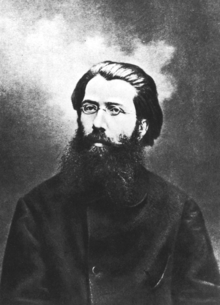
Back كارلو كافيرو Arabic كارلو كافيرو ARZ Carlo Cafiero Catalan Carlo Cafiero German Carlo Cafiero Esperanto Carlo Cafiero Spanish Carlo Cafiero French Carlo Cafiero Italian Carolus Cafiero Latin Carlo Cafiero Polish
Carlo Cafiero | |
|---|---|
 Cafiero (1878) | |
| Born | 1 September 1846 Barletta, Apulia, Kingdom of the Two Sicilies |
| Died | 17 July 1892 (aged 45) Nocera Inferiore, Campania, Kingdom of Italy |
| Nationality | Italian |
| Alma mater | University of Naples |
| Occupation(s) | Activist, revolutionary, writer |
| Years active | 1870–1882 |
| Era | Late modern period |
| Organization(s) | International Workingmen's Association (1870–1872) Anti-Authoritarian International (1872–1881) Italian Revolutionary Socialist Party (1882) |
| Movement | Anarchism, Marxism |
| Spouse | Olimpia Kutuzova |
| Part of a series on |
| Anarchist communism |
|---|
 |
| Part of a series on |
| Communism in Italy |
|---|
 |
|
|
Carlo Cafiero (1 September 1846 – 17 July 1892) was an Italian anarchist that led the Italian section of the International Workingmen's Association (IWA). An early leader of the Marxist and anarchist communist movements in Italy, he was a key influence in the development of both currents.
Born into a noble family in Apulia, he came to dislike the institutions of the Catholic Church and the monarchy, which drew him towards republicanism and revolutionary socialism. After moving to London, he fell under the influence of Karl Marx and Friedrich Engels, for whom he acted as an agent after returning to Italy. In Naples, he became a leader of the local internationalist movement, which consisted largely of anarchists. This caused friction between him and Engels, who saw anarchism as a threat to Marxism.
As Marx and Engels consolidated control over the IWA, Cafiero gravitated closer to anarchism, culminated with his meeting with Mikhail Bakunin. He then presided over the affiliation of the IWA's Italian section with Bakunin's Anti-Authoritarian International and its reorganization along anarchist lines. As a central figure in the Italian anarchist movement, Cafiero plotted the 1874 Bologna insurrection and led the 1877 Benevento insurrection, for which he was imprisoned. Cafiero then turned his attentions to writing. He penned a summary of Das Kapital, Volume I, a theoretical synthesis of anarchist communism and a series of articles about social revolution.
A committed insurrectionary anarchist, Cafiero clashed with the reformist Andrea Costa over their respective tactical outlooks. But following a period of extreme intransigence, isolation and mental decline, Cafiero himself moved towards social democracy and endorsed Costa's candidacy in the 1882 Italian general election. In the months after the election, Cafiero succombed to his mental illness and was committed to a mental asylum. After a long battle with his condition, he died in an asylum from gastrointestinal tuberculosis.
Cafiero left a large legacy as an influential figure in the formation of the Italian anarchist and socialist movements. His figure was a source of inspiration for future generations of Italian activists and artists, and his works are still being studied into the 21st century.